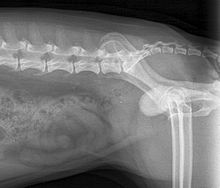


Bladder stones or uroliths are a common occurrence in animals, especially in domestic animals such as dogs and cats.[1] Occurrence in other species, including tortoises,[2] has been reported as well. The stones form in the urinary bladder in varying size and numbers secondary to infection, dietary influences, and genetics. Stones can form in any part of the urinary tract in dogs and cats, but unlike in humans, stones of the kidney are less common and do not often cause significant disease, although they can contribute to pyelonephritis and chronic kidney disease. Types of stones include struvite, calcium oxalate, urate, cystine, calcium phosphate, and silicate. Struvite and calcium oxalate stones are by far the most common. Bladder stones are not the same as bladder crystals but if the crystals coalesce unchecked in the bladder they can become stones.
- ^ "Dietary treatment of bladder stones". Clinical Nutrition Service at Cummings School. 2017-07-26. Retrieved 2020-02-08.
- ^ Giant tortoise cheats death Archived July 26, 2011, at the Wayback Machine ("Evening Express", Aberdeen, 31/01/2009)